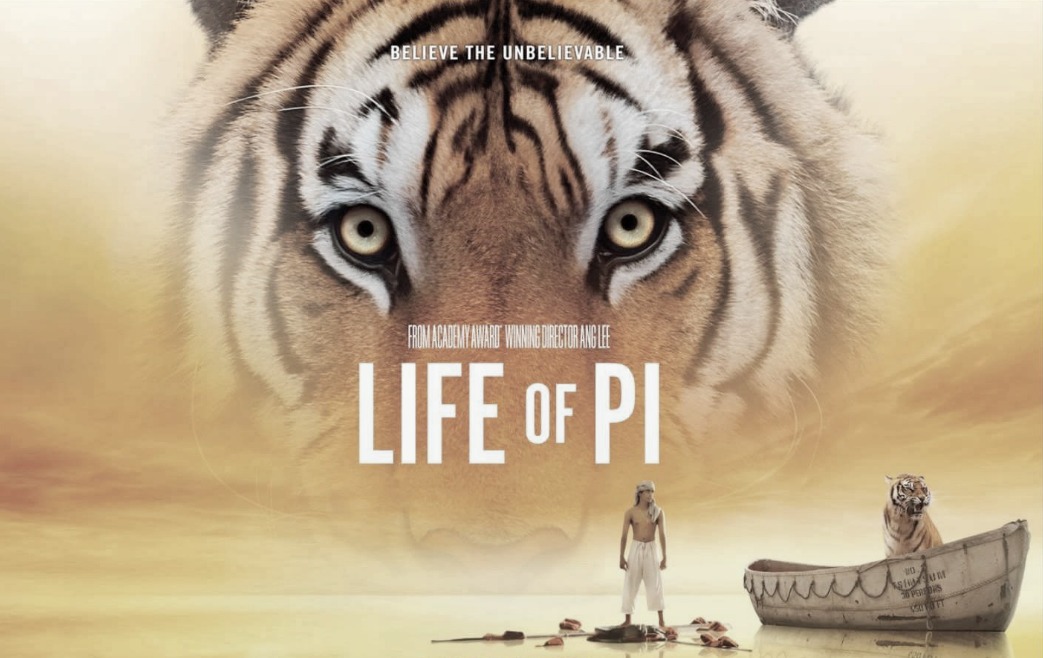We love movies. Whether we’re heading off to the movie theater or popping fluffy white corn at home, one of our favorite things to do together is to sit and watch a good flick. When The Greatest Kid On The Planet sees a movie he likes, he’ll watch it again and again (and again). This summer, he’s been hooked on a story he saw for the first time during spring break. It’s a movie that came out some years ago about a boy and a Bengal tiger called Life of Pi.
Life of Pi was written by Yann Martel and published in 2001. The movie, released in 2012, received both Golden Globes and Academy Awards, but I had never seen it until earlier this year.
The movie tells the story of a young boy named Pi growing up in Pondicherry, India, where his family owns a zoo. Raised as a Hindu, Pi takes a special interest in Christianity and Islam, and in his father’s zoo animals, most especially, a Bengal tiger named Richard Parker.
When Pi is sixteen, his father announces that he is moving the family to Canada, so they make the long voyage across the Pacific on a Japanese freighter that is transporting their zoo animals. A bad storm and a twist of fate leave Pi stranded in the middle of the ocean on a life boat along with some of the animals, including Richard Parker.
The remainder of the movie tells the story of what happens to Pi and Richard Parker, and the other animals, while adrift on the Pacific Ocean until being found washed ashore, two hundred and twenty-seven days later, on the coast of Mexico.
It’s a unique and moving tale. My son is enthralled by the story of a young boy alone in the middle of the sea with a tiger, and, whenever he is watching it, I find it hard to walk away. The visuals are stunning, and the immense power of the ocean and its peaceful serenity are portrayed in a way that is breathtaking. Pi, staring at the stars, marveling at the wonders of the sea, and questioning whether he has seen the last of his days, will make just about anyone examine the sum of their own life.
What I find so alluring is the way the story blurs the line between fantasy and reality and leaves you wondering which is which. There is a mystic quality to some of the scenes which is in stark contrast to the cold reality of others. The whole movie leaves you with a little chill.
This story is, without a doubt, one of courage and compassion, and the instinct for survival which is inherent in all of us. But to leave it at that would be doing it an injustice. In an interview with Jennie Renton, Yann Martel summarized the subtext of his tale in three statements…Life is a story…You can choose your story…A story with God is the better story.
I’ll admit, the first time I watched Life of Pi, I didn’t see it all the way through (shame on me), and it wasn’t until this summer that I watched it in its entirety. I was struck by what I had missed the first time, and my whole perception of the movie changed.
Anyone who has seen this film understands that you need to watch it to the end, or you’ll miss the significance the author so carefully crafted into his tale. It’s one that will make you question your spirituality and beliefs in a unique way, leaving you with the realization that reality is, in fact, subjective, and a choice that you make.
I had to wonder last weekend, when we watched the movie again, whether The Greatest Kid understood the significance of all he had seen and heard. When we spoke about it after, I pointed a few things out to him, and I watched his face change.
Just the other night at dinner, he looked at me and said, “I can’t stop thinking about that movie.”
“Me, neither,” I said.
If you haven’t seen Life of Pi, put it on your watch list. It’s a good one. And it will leave you pondering.
M.C. Greene


